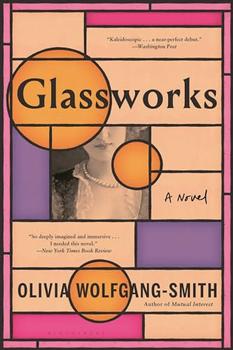Summary | Excerpt | Reading Guide | Reviews | Beyond the Book | Readalikes | Genres & Themes | Author Bio

one
The Bohemian glass modeler went mad the summer of Agnes's marriage, and naturally at first society and the university board and Agnes's husband assumed a connection.
They had been so often thrown together, since Ignace had come to Boston. Since Agnes had brought him to Boston. It was nearly as if she had captained the ship herself, according to gossip and political cartoonists. Really it was her money that had done it. Dollar-green paper hands crewing the vessel, packing Ignace Novak's valises, shuttering his studio in Prague—and installing him in Cambridge with shelves of glass and enamel and a foot-powered bellows to melt it and a shotgun-startled expression on his face, hat knocked back as if by a blow, hair frazzled with the grease of his sudden voyage.
Agnes had long since learned what money could do, for better and for worse. It could tangle people into hopeless snarls, or spin them into neat skeins according to her specifications. It took skill to wield such a tool safely. Agnes's father had recognized that skill in her, and left her in control of the family finances. An unusual arrangement, but there was precedent.
If it had had a genotype, their fortune would have been of the female sex. Its ancestral beginnings had been amassed by a colonial she-merchant named Prudence Smith, already twice widowed when she engaged Agnes's great-great-grandmother Elizabeth as a maidservant in the 1760s. Eventually Elizabeth had held a kind of combined position, as both a social companion and the steward of Prudence's business affairs. She had lived in a suite of rooms in the Smith mansion until she married; after, she kept house with her husband but worked out of a shared office above Prudence's dry-goods store. Altogether the two women were associated for decades, spanning the birth of the nation—and when she passed, Prudence had willed her fortune and her business both to Elizabeth.
It was not such a terrible scandal—the widow had been childless and solitary, and Agnes's ancestor by that point both business partner and devoted friend.
She was rather more than that, in fact. Agnes had found the letters when she had the roof raised on their town house. Over a century old, hidden under an attic floorboard, was a bundle of correspondence from Prudence to Agnes's great-great-grandmother—from the latter days of their association, shortly before Prudence's death. Some were dense, frankly boring accounts of goods bought and sold, ledgers and inventory. Others seemed to reference the widow's illness, the fortune shortly to pass to Elizabeth. "Take care of the business," Prudence had ended one letter in cramped but confident script; "it is yours." A flourish on that word so emphatic there was a tear in the paper.
And some letters had referenced business not at all. Agnes now knew much about her ancestor that more formal records could not reveal: that she had had eyes deep and gray-green as the sea; hair the color and texture of honey (or wheat, or sunlight—Prudence often returned to the subject); a port-wine birthmark high on one thigh. There were no copies of Elizabeth's responses, so Agnes could not divine her feelings precisely—but Prudence's letters had been neatly wrapped in chintz and tied with a bow that had lasted over a century.
The first letter in the packet, dated just after Elizabeth's marriage, had been a feverish kind of nuptial congratulation. "Stephen is a good man, and you deserve him," Prudence had written. "You deserve more, too. Save a part for yourself, and another for me." There followed suggestions as to which parts Prudence would prefer.
Agnes had shown the letters to her mother, who promptly burned them. A misplaced panic, Agnes thought—given the ways of the world (she could list a dozen local scholars and gentlemen of parallel inclinations); given that Providence had by all accounts bestowed an approving smile on Prudence and Elizabeth; given that it was all in the past.
Excerpted from Glassworks by Olivia Wolfgang-Smith. Copyright © 2023 by Olivia Wolfgang-Smith. Excerpted by permission of Bloomsbury USA. All rights reserved. No part of this excerpt may be reproduced or reprinted without permission in writing from the publisher.
Never doubt that a small group of thoughtful, committed people can change the world...
Click Here to find out who said this, as well as discovering other famous literary quotes!
Your guide toexceptional books
BookBrowse seeks out and recommends the best in contemporary fiction and nonfiction—books that not only engage and entertain but also deepen our understanding of ourselves and the world around us.